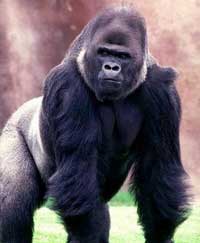Gorilla also suffers from menopause
 Jenny, Shamba, Timbo, Beta and Elaine are zoo gorillas, but they have one thing in common with millions of women: They also experience menopause.
Jenny, Shamba, Timbo, Beta and Elaine are zoo gorillas, but they have one thing in common with millions of women: They also experience menopause.
Research on 30 gorillas at 17 North American zoos has yielded the first conclusion about menopause in this animal. The results can help zoos improve the care of old female monkeys and change biologists' perceptions of menopause.
" Are they bleeding? Are they hard to stay? We need more time to determine this, " said Sue Margolis, research author at Lincoln Park Zoo in Chicago.
Many biologists believe that menopause is born to help grandmothers have more time to take care of their grandchildren, said Steve Austad at the University of Texas.
The new results upset that notion because female gorillas in nature often separated from their families and did not stay to take care of their grandchildren. Instead of an evolutionary adaptation, menopause merely helps monkeys live longer.
" This will make biologists evolve to think again. Now they still think that humans are unique. But maybe gorillas also live up to 75 years and the last 25 years are postmenopausal. " , Austad said.
The oldest captive monkey is now 51-year-old Jenny at the Dallas Zoo. It is one of 30 monkeys in the study and among 23% of the menopausal monkeys.
Another 32% have abnormally variable levels of hormones for several months, a sign that they are approaching menopause. The average menopause age of gorilla is 44. In women, menopause comes at age 51.
Research began when Margolis did not know whether the 40-year-old Alpha Monkey at Brookfield Zoo should be given oral contraceptives when it was still interested in sex. Usually people give monkeys oral contraceptives to control reproduction.
Margolis tested Alpha's hormone and found its content low enough to require contraception. Gorillas have monthly menstrual cycles with very little blood. They mate throughout the year.
- The killer whale also suffers from menopause
- Gorilla hugged each other to rejoice
- Unexpected discovery of menopause
- Baby gorilla in the mother's arms
- Menopause is caused by 'gene war'.
- Newborn gorillas in mother's arms
- Menopause 7 years still give birth to healthy children
- Eating more refined carbohydrates can be associated with early menopause
- Strange gorillas come back like people
- Albino gorilla is a product of incest
- Menopause at age 30
- Congo established gorilla sanctuary
 Animal 'suffering' after hibernation
Animal 'suffering' after hibernation Why do goats climb well?
Why do goats climb well? Scientists were surprised to see chimpanzees eating turtles
Scientists were surprised to see chimpanzees eating turtles Giant catfish died deadly due to drought in Thailand
Giant catfish died deadly due to drought in Thailand